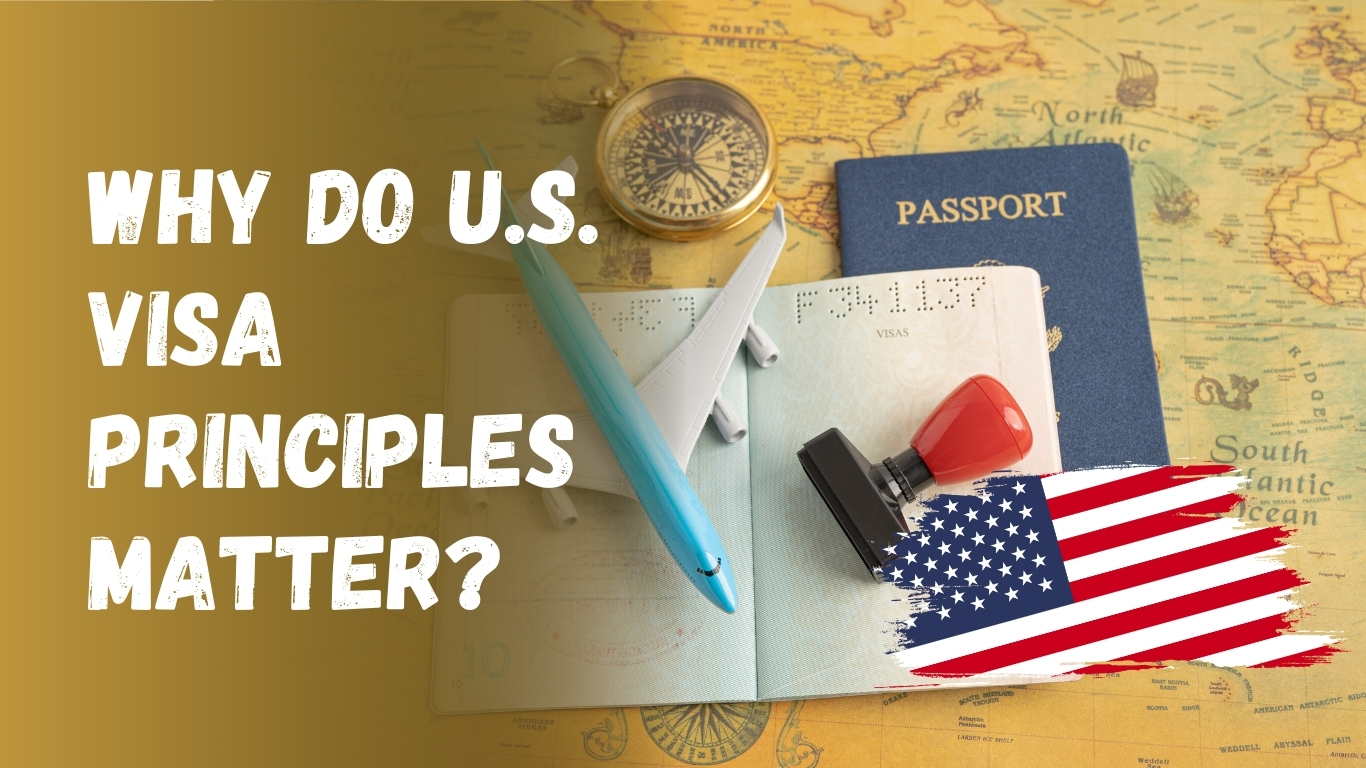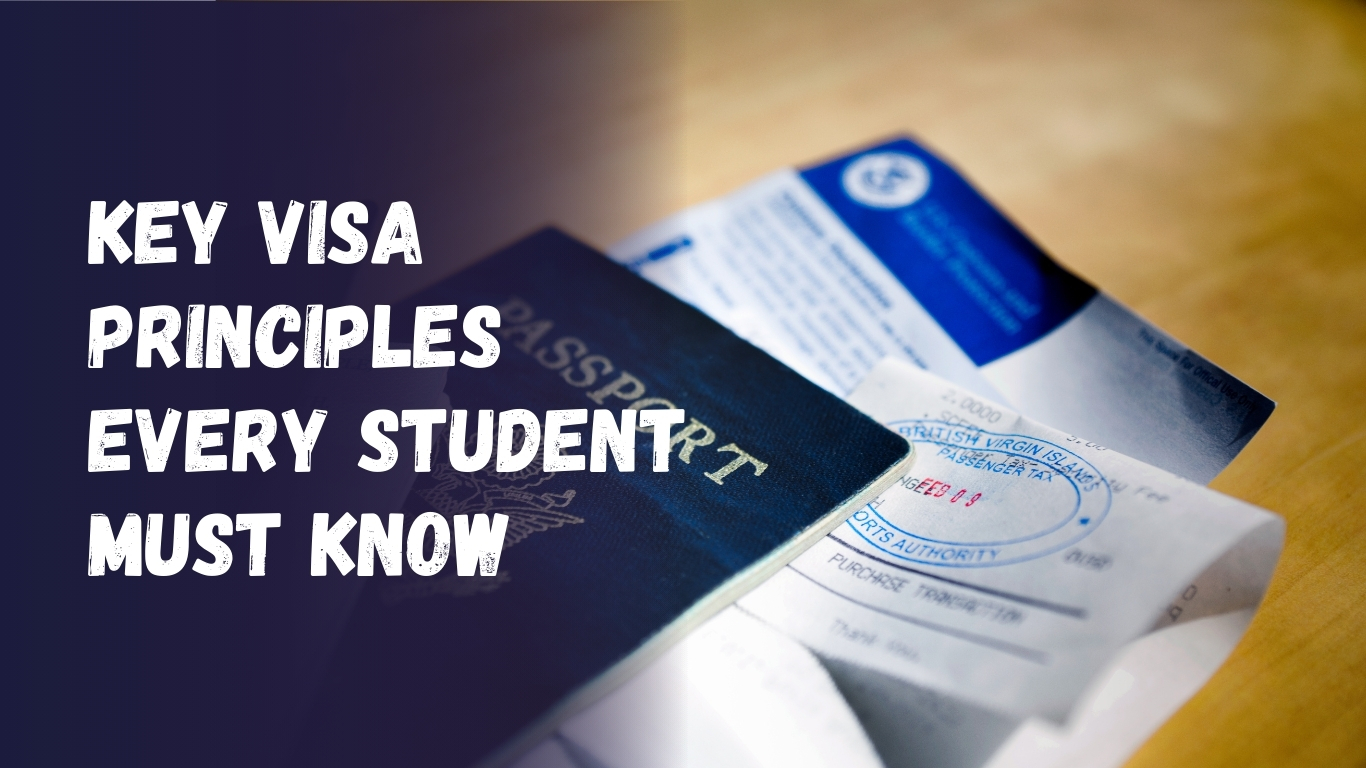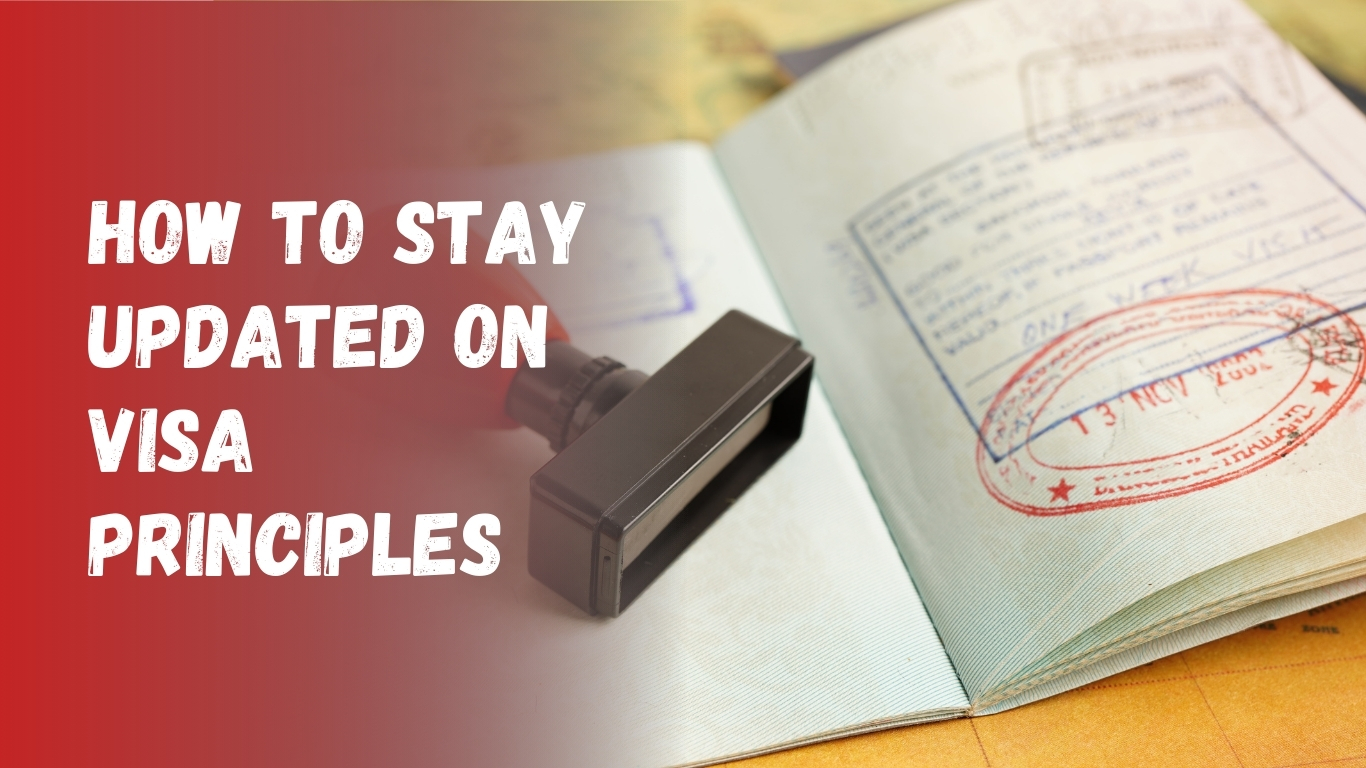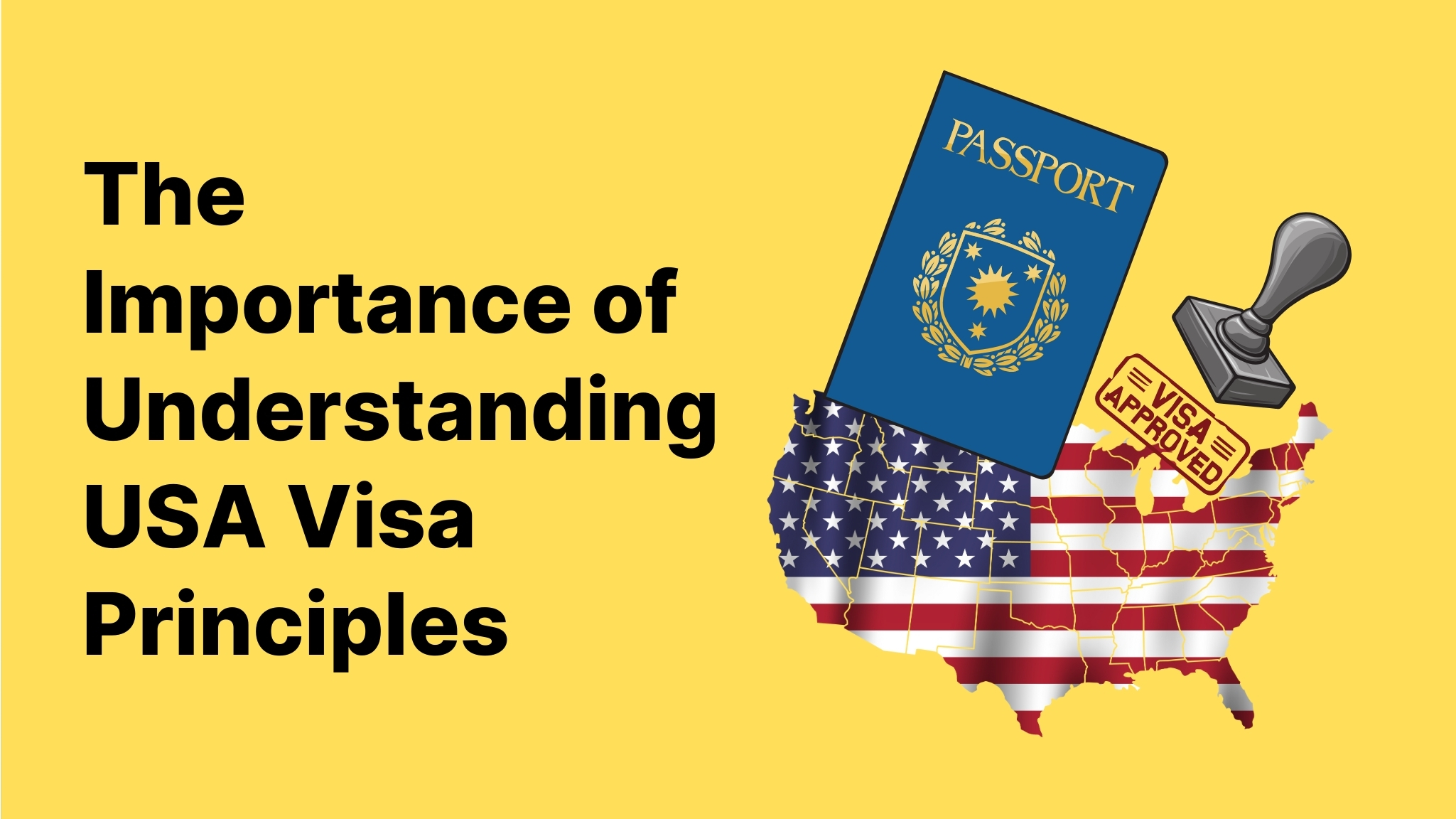Introductions
Dreaming of studying, working, or just soaking in the American vibe? You’re not alone. Every year, millions of students from Asia pack their dreams (and way too much luggage!) to embark on a journey to the United States. But before you book that flight or imagine yourself sipping coffee in New York, there’s one big hurdle to cross—understanding U.S. visa principles.
Now, let’s be honest. Words like “visa regulations” or “immigration policies” can feel as intimidating as a 10-hour math exam. But here’s the thing: the better you understand how visas work, the smoother your journey will be. Think of this knowledge as your personal GPS—guiding you through the twists and turns of paperwork, deadlines, and visa interviews.
Here’s a fun fact to keep you motivated: In 2023, over 1.2 million international students successfully got U.S. visas, with a significant chunk coming from Asian countries. That’s proof that it’s possible—if you’re prepared. On the flip side, did you know that over 25% of student visa applications get rejected due to small errors, missing documents, or not understanding the rules? Yikes!
But don’t worry, this isn’t going to be one of those boring, jargon-filled guides. This blog is your friendly, go-to companion, breaking down U.S. visa principles in the simplest way possible. No big words. No legal mumbo jumbo. Just clear, actionable advice to help you avoid common pitfalls.
Wondering what you’ll learn here?
- Why understanding visa rules isn’t optional (Hint: Ignorance isn’t bliss!)
- How to avoid rookie mistakes that could derail your dreams.
- What to do if things don’t go as planned (because life isn’t always perfect).
Whether you’re dreaming of joining the next Silicon Valley tech boom, earning a degree from a top university, or simply exploring American culture, understanding visa principles is your first step. Ready to make sense of it all? Let’s dive in and turn that visa stress into visa success!
Check out our another blog about Complete F1 Visa Guide.

Why Do U.S. Visa Principles Matter?
Navigating the U.S. visa process involves more than submitting forms or attending an interview. Visa principles define the rules, responsibilities, and privileges associated with your legal stay in the United States. Misunderstanding or overlooking these principles can lead to serious consequences, such as visa revocation or deportation.
Imagine this: you’ve been accepted into your dream U.S. university, your bags are packed, and you’re ready to board the flight. But suddenly, you find yourself stuck because of an issue with your visa. Sounds like a nightmare, right? That’s exactly why understanding U.S. visa principles isn’t just important—it’s absolutely crucial.
The Foundation of Your American Journey
Your visa isn’t just a piece of paper—it’s the foundation of your entire experience in the U.S. From your entry into the country to what you can (and cannot) do while you’re there, visa principles dictate everything. Want to work part-time to cover your expenses? That’s only possible if your visa type allows it. Planning to extend your stay after graduation? You’ll need to follow specific guidelines to make that happen.
Why It’s More Than Just Rules
Think of visa principles as a roadmap. Without understanding them, it’s easy to take a wrong turn. Here’s what’s at stake:
- Legal Compliance: Violating visa rules can lead to deportation or a ban from re-entering the U.S. (and trust me, no one wants that).
- Smooth Travel: Ever been stopped at an airport for “additional questioning”? A lot of students face this due to small errors like missing documents or unclear travel plans.
- Future Opportunities: If you follow the rules, you open doors to future visa types, like work visas (H-1B) or even green cards.
Real-Life Example: What Can Go Wrong?
Take the case of Raj, a student from India. Raj worked off-campus without proper authorization under his F-1 visa. He didn’t realize it was a violation. When applying for an internship later, he was flagged during a background check, and his visa was revoked. Raj had to return home halfway through his degree.
Mistakes like this are more common than you think. According to a recent study, 30% of visa violations occur due to students not fully understanding the rules.
Knowledge = Peace of Mind
Understanding visa principles isn’t just about following the rules; it’s about protecting your dreams. When you know what’s allowed, you’ll have fewer sleepless nights worrying about whether you’re on the right track.
So, why do U.S. visa principles matter? Because they’re your safety net, guidebook, and toolkit for building a secure and successful future in the U.S. It’s not about memorizing a long list of rules—it’s about being informed enough to make smart decisions.
Ready to unlock the full potential of your U.S. journey? Let’s keep going—because this is just the beginning!
Types of U.S. Student Visas
1. F-1 Visa (Academic Students)
The F-1 visa is the most common choice for international students enrolling in academic programs.
Key Features:
- Must maintain a full course load (minimum credit hours vary by school).
- Limited to part-time on-campus work during the academic year.
- Eligible for OPT (up to 12 months of work authorization) after completing your program.
2. J-1 Visa (Exchange Visitors)
The J-1 visa is for exchange programs and may include internships, training programs, or cultural exchanges.
Key Features:
- Requires sponsorship by an organization or institution.
- May include a two-year home-country residency requirement after the program.
- Limited work authorization based on program terms.
3. M-1 Visa (Vocational Students)
The M-1 visa is designed for students in vocational or technical training programs.
Key Features:
- Does not allow work authorization, except for practical training after completing the program.
- Requires proof of financial stability to cover the entire course duration.
Want to know the fee structures of the U.S education for international students? Check this out Complete Fee Structures for Study in U.S.A.

Key Visa Principles Every Student Must Know
1. Maintain Full-Time Enrollment
For F-1 visa holders, full-time enrollment is a non-negotiable requirement. Dropping below the required credit hours without prior authorization from your DSO can jeopardize your visa status.
2. Work Restrictions and Authorization
Student visas have strict work regulations:
- On-Campus Employment: Permitted for up to 20 hours per week during semesters and full-time during breaks.
- Off-Campus Employment: Requires special authorization, such as OPT or CPT. Working without authorization is a serious violation that could result in deportation.
3. SEVIS (Student and Exchange Visitor Information System) Compliance
SEVIS is the database that tracks and manages international students in the U.S. You must ensure your record in SEVIS is accurate and up-to-date. This includes:
- Reporting changes in address or academic program.
- Keeping your I-20 (for F-1 students) or DS-2019 (for J-1 students) valid.
4. Financial Proof
Most U.S. visas require applicants to demonstrate financial stability. For students, this means showing you have enough funds to cover tuition, living expenses, and other costs for at least one academic year.
Pro Tip: Prepare official bank statements, sponsorship letters, or scholarship documentation well in advance.
5. Travel and Re-Entry Requirements
If you plan to travel outside the U.S. during your studies, ensure your visa is valid for re-entry. You’ll also need:
- A valid passport (at least six months beyond your intended stay).
- An endorsed I-20 or DS-2019 from your DSO.
Failing to meet re-entry requirements could leave you stranded outside the U.S.
Learn more about how to get job as an International Student?

How to Stay Updated on Visa Principles
Let’s be honest—U.S. visa principles aren’t exactly light reading. They can feel like navigating a maze where the walls keep shifting. But staying updated isn’t just a smart idea—it’s essential for avoiding visa issues and making the most of your time in the U.S. Whether it’s figuring out travel permissions, maintaining your status, or preparing for work opportunities like CPT or OPT, being in the know can save you from unnecessary stress. So, how do you stay informed without feeling overwhelmed? Let’s break it down.
1. Rely on Your University’s International Office
Your university’s international student office is your go-to resource. These offices are staffed with experts who are well-versed in visa regulations and their latest updates. They host workshops, send email alerts, and even offer one-on-one advising.
- Example: Did you know that 65% of F-1 students get their first visa renewal tips from their university’s international office? So, don’t hesitate to knock on their door or check their website regularly.
Pro Tip: Sign up for their newsletters or notifications to get real-time updates.
2. Bookmark Official Government Websites
When it comes to reliable information, there’s no better source than the U.S. government itself. Websites like USCIS.gov and Travel.State.Gov are updated with the latest visa regulations, deadlines, and processing changes.
- For example, when the U.S. Department of Homeland Security (DHS) extended STEM OPT eligibility, these sites were the first to announce the changes.
- Fun Fact: Over 80% of U.S. visa-related queries are answered on government websites, yet many students miss out because they rely on second-hand sources.
Pro Tip: Check these sites monthly to ensure you’re up-to-date on the rules that apply to your visa.
3. Join Online Communities and Forums
Sometimes, the best advice comes from students who’ve been in your shoes. Platforms like Reddit (r/IntltoUSA), Facebook groups, or even LinkedIn communities are filled with real-life experiences, tips, and updates. While you should always cross-check information, these communities are great for learning about trends and common challenges.
- Example: In 2023, many students on Reddit shared how visa interview wait times were unusually long in specific countries, prompting others to book early.
- Stat to Know: About 40% of international students turn to online forums for quick guidance on visa matters.
Pro Tip: Don’t just lurk—ask questions! The more specific you are, the better advice you’ll get.
4. Follow Immigration Attorneys and Experts on Social Media
Let’s admit it—most of us spend hours scrolling through Instagram or TikTok anyway. Why not make it productive? Many immigration lawyers and visa experts share short, digestible updates on platforms like Instagram, Twitter (X), and YouTube.
- For instance, accounts like @HackingLawPractice regularly post updates on visa regulations and answer common student questions.
- Stat Alert: A survey by NAFSA found that 29% of international students learn about visa changes through social media.
Pro Tip: Be selective about who you follow. Look for verified experts or accounts associated with legal practices.
5. Subscribe to Immigration Newsletters
If you prefer getting information delivered directly to your inbox, immigration newsletters are a fantastic option. Services like Visa Bulletin Updates or newsletters from law firms like Fragomen provide monthly insights into visa trends, policy changes, and deadlines.
- Did You Know? In 2022, over 150,000 students subscribed to visa-related newsletters for real-time updates.
Pro Tip: Look for newsletters tailored to F-1 visa holders or international students for the most relevant info.
6. Leverage Technology: Apps and Alerts
Technology can be your best friend. Apps like Lawfully and Boundless are specifically designed to help visa holders track their applications and stay informed about updates. You can even set up Google Alerts for keywords like “F-1 visa regulations” to get notified whenever there’s news.
- Example: Lawfully sends push notifications if there are significant policy changes affecting your visa status.
- Stat to Know: Nearly 1 in 4 international students use apps or alerts to stay informed about immigration updates.
Pro Tip: Customize your alerts to avoid getting overwhelmed by irrelevant information.
7. Stay Connected with Alumni and Mentors
Sometimes, the best advice comes from those who’ve already walked the path. Connect with alumni from your university who were also international students. They often have firsthand insights into visa requirements and how to handle tricky situations.
- Example: Alumni networks frequently host Q&A sessions about visa renewals or transitioning to work visas like H-1B.
- Fun Fact: Students who actively engage with alumni networks are 30% more likely to avoid visa-related issues.
Pro Tip: Use LinkedIn to find alumni in your field and reach out for guidance.
8. Attend Webinars and Immigration Events
Many universities and professional organizations host webinars on visa updates and immigration topics. These events often feature guest speakers, including lawyers and immigration officers, who provide actionable advice.
- Example: In 2023, NAFSA hosted over 200 webinars focused on F-1 and H-1B visa updates, drawing thousands of attendees.
- Stat to Know: 72% of international students who attend visa-related webinars report feeling more confident about navigating U.S. immigration policies.
Pro Tip: Keep an eye on your university’s event calendar or professional association websites to register early.
9. Develop a Habit of Regular Check-Ins
Visa principles aren’t something you can learn once and forget. Policies can change, deadlines can shift, and new opportunities (or restrictions) can arise. Make it a habit to review your visa status and any updates at least once every few months.
- Set reminders to check resources like your university’s international office, official government sites, and trusted social media accounts.
- Consider it like studying for a big exam—you don’t want to cram last minute!

Consequences of Violating Visa Principles
Violating U.S. visa principles can lead to serious consequences, disrupting your education, career, and future plans.
- Visa Revocation: Even minor violations, like overstaying, can result in your visa being canceled. Over 15,000 students faced revocations in 2022 alone.
- Deportation & Travel Bans: Overstaying by 180+ days can trigger a 3-year ban, while a year-long overstay may lead to a 10-year ban from the U.S.
- Future Visa Challenges: Violations make it harder to secure new visas. About 70% of flagged applicants face delays or denials in subsequent applications.
- Educational Impact: Unauthorized work or academic non-compliance can disrupt your studies and result in lost tuition or scholarships.
- Emotional & Financial Stress: Deportation or legal battles can cost upwards of $3,000-$10,000 and create unnecessary anxiety.
Tip: Stay proactive—know your visa rules, meet deadlines, and consult your school’s international office when in doubt. Remember, compliance is the key to keeping your U.S. dreams alive!
How to Avoid Violations
Understanding the consequences of visa violations is the first step, but here’s how to stay compliant:
- Know Your Visa Rules: Familiarize yourself with the terms of your visa, such as work restrictions, credit hour requirements, and travel permissions.
- Stay Organized: Use tools like Google Calendar or task management apps to track important deadlines, such as OPT applications or visa renewals.
- Ask Questions: When in doubt, consult your university’s international office, an immigration lawyer, or reliable resources like USCIS.gov.
- Keep Records: Maintain a file of all your visa-related documents, including I-20 forms, travel stamps, and work authorization approvals.
FAQs About U.S. Visa Principles
1. Can I work while studying on an F-1 visa?
Yes, but only on-campus and for up to 20 hours per week during the academic year. Off-campus work requires authorization through OPT or CPT.
2. What happens if I fall below full-time enrollment?
Falling below full-time enrollment without prior approval can result in termination of your visa status. Always consult your DSO before making changes to your course load.
3. How do I renew my student visa?
To renew your visa, you’ll need a valid I-20 form, proof of enrollment, and a visa application appointment at a U.S. embassy or consulate.
4. Can I transfer schools on the same visa?
Yes, but you must notify your current DSO, obtain a new I-20 from your new school, and transfer your SEVIS record.
